At HH The Bloody Truth, we understand the challenges faced by those managing hemochromatosis. We realized that while supplements can provide immense benefits, the sheer number of pills needed each day can be overwhelming—both to your routine and your budget. That’s why we created the Hemochromatosis Master Mix.
Our Hemochromatosis Master Mix combines essential, carefully selected, and proven supplements into one convenient, easy-to-use formula. We’ve simplified your supplement regimen using only organic, vegan, and non-GMO ingredients. Our product is 3rd-party lab tested for heavy metals to ensure purity and safety, and we adhere to the highest quality standards—all made right here in the USA.
By choosing our Hemochromatosis Master Mix, you not only save time and energy but also experience significant savings compared to buying individual supplements. We’ve done this to support our community, ensuring you receive the best without compromise.
Take action for your health today and invest in simplicity, quality, and peace of mind with the Hemochromatosis Master Mix.
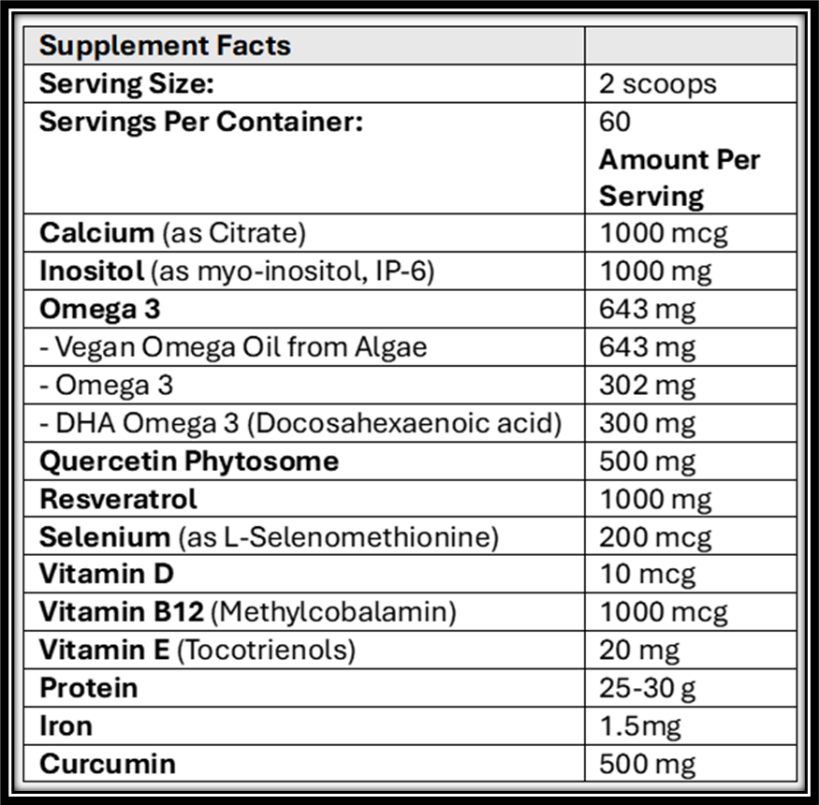
OUR LAB IS CGMP CERTIFIED:
This means we are audited 1-2 times per year by a third-party organization to ensure we’re in compliance with FDA standards and manufacturing practices. This means our manufacturing facility meets the criteria for product purity and quality, specifications for finished products, cleanliness, laboratory controls, documentation, equipment control, and operational deviations.
Calcium can help reduce iron absorption in the gastrointestinal tract, which can be beneficial for managing iron levels in people with this condition. Here’s how calcium intake can be beneficial for someone with hemochromatosis:
- Competitive Absorption: Calcium competes with iron for absorption in the intestines. When calcium is present, it can partially inhibit the absorption of non-heme iron (iron from plant-based foods and fortified products). This is especially useful for people with hemochromatosis, as it can help reduce the excessive iron buildup in the body.
- Bone Health: Hemochromatosis can lead to joint pain and osteoporosis due to the excess iron affecting bone density. Adequate calcium intake supports bone health and helps mitigate the risk of osteoporosis, which can be a concern for those with hemochromatosis.
- Reduced Need for Medications: By naturally lowering iron absorption through diet, calcium can sometimes reduce the need for other treatments aimed at managing iron levels, such as chelation therapy. This can help manage the condition with fewer side effects.
Inositol, a naturally occurring compound sometimes referred to as “IP6,” has potential benefits for individuals with hemochromatosis, primarily because it can help support liver health and reduce oxidative stress. Here’s how inositol can be helpful for managing hemochromatosis:
- Liver Support: Hemochromatosis often leads to excess iron buildup in the liver, which can cause damage and inflammation over time. Inositol has been shown to support liver function by helping to regulate fat metabolism, potentially reducing the likelihood of fatty liver disease—a condition that people with hemochromatosis are at higher risk for. Healthy liver function is crucial for iron regulation and overall health.
- Antioxidant Properties: Inositol may play a role in reducing oxidative stress, which is a common issue for people with hemochromatosis due to iron overload. Excess iron can promote the formation of free radicals, which can damage cells and tissues. By supporting antioxidant defenses, inositol may help protect against this type of cellular damage.
- Mental Health and Mood Stability: People with hemochromatosis may experience mood swings or symptoms related to mental health, partly due to the effects of iron on the brain and nervous system. Inositol has been studied for its potential to support mood stability and reduce anxiety by influencing neurotransmitter function. This can help improve overall quality of life for individuals managing the chronic effects of hemochromatosis.
- Blood Sugar Regulation: Some studies suggest that inositol might help regulate blood sugar levels by enhancing insulin sensitivity. Since hemochromatosis can affect glucose metabolism, supporting balanced blood sugar levels is beneficial for managing the condition.
Omega-3 -vegan oil from algae, especially with DHA (docosahexaenoic acid), can be highly beneficial for individuals with hemochromatosis because of its anti-inflammatory, cardiovascular, and liver-protective properties. Here’s why it’s particularly helpful for managing the condition:
- Anti-Inflammatory Effects: Excess iron in hemochromatosis can increase inflammation in the body, contributing to joint pain, liver inflammation, and damage to various organs. Omega-3 fatty acids, especially DHA, are well-known for their anti-inflammatory properties. By reducing inflammation, DHA can help mitigate some of the inflammatory effects caused by iron overload.
- Liver Protection: The liver is one of the organs most affected by iron overload in hemochromatosis. DHA has been shown to support liver health by reducing fatty deposits and improving liver enzyme levels. This is important, as a healthy liver helps regulate iron storage and prevent iron toxicity in the body.
- Cardiovascular Health: Hemochromatosis increases the risk of heart disease because excess iron can lead to oxidative stress, damaging blood vessels and heart tissues. DHA helps support cardiovascular health by reducing triglycerides, improving cholesterol levels, and lowering blood pressure. These benefits can be critical for someone with hemochromatosis to reduce heart-related risks.
- Brain and Nervous System Support: Hemochromatosis can sometimes impact brain health due to iron accumulation in the nervous system. DHA is a crucial component of brain and nerve cells, supporting cognitive function and mood stability. By protecting the nervous system, DHA can help improve quality of life for individuals with hemochromatosis.
- Vegan Source from Algae: Algae-based omega-3s are a vegan, sustainable source of DHA, unlike fish oil. Since some people with hemochromatosis are cautious about consuming certain animal products, algae-based omega-3s offer an excellent alternative to maintain a balanced and health-conscious diet.
Quercetin Phytosome, a bioavailable form of the antioxidant quercetin, offers several benefits for individuals with hemochromatosis by helping to manage iron levels, reduce oxidative stress, and support liver and cardiovascular health. Here’s why it can be particularly important:
- Iron-Chelating Properties: Quercetin has natural iron-chelating abilities, meaning it can bind to iron and reduce its absorption. This is useful for individuals with hemochromatosis, as it can help control excess iron levels and minimize iron buildup in organs and tissues, which is the primary concern with the condition.
- Antioxidant and Anti-Inflammatory Effects: Excess iron can lead to oxidative stress, causing inflammation and cellular damage. Quercetin is a potent antioxidant that helps neutralize free radicals, reducing oxidative damage. It also has anti-inflammatory properties, which can alleviate symptoms like joint pain and protect tissues from inflammation-related harm.
- Liver Health Support: The liver is especially vulnerable in hemochromatosis because it stores much of the excess iron. Quercetin has been shown to support liver function by protecting it from oxidative damage and inflammation, which can help maintain liver health and reduce the risk of iron-related liver disease.
- Cardiovascular Protection: Iron overload can contribute to heart issues and blood vessel damage. Quercetin promotes cardiovascular health by improving blood vessel function and reducing blood pressure. Its antioxidant effects also protect the cardiovascular system from damage caused by oxidative stress, a key concern for people with high iron levels.
- Improved Bioavailability with Phytosome: The phytosome form of quercetin significantly enhances its bioavailability, allowing for better absorption and effectiveness in the body. This makes it easier to achieve therapeutic effects with smaller doses, which is beneficial for those looking to optimize iron management without high doses of supplements.
Resveratrol, a powerful antioxidant found in grapes, berries, and certain plants, offers unique benefits for individuals with hemochromatosis due to its effects on iron regulation, oxidative stress reduction, and organ protection. Here’s how it can support those with this condition:
- Iron-Chelating Properties: Resveratrol has been shown to have mild iron-chelating properties, meaning it can help bind to and reduce excess iron in the body. For individuals with hemochromatosis, this helps lower iron levels, especially in tissues and organs, preventing the buildup that leads to organ damage.
- Antioxidant and Anti-Inflammatory Benefits: Resveratrol is a strong antioxidant, combating oxidative stress caused by excess iron. It neutralizes free radicals and reduces inflammation, helping to protect tissues from iron-induced oxidative damage. This is particularly important as chronic inflammation and oxidative stress are key concerns for people with hemochromatosis.
- Liver and Heart Protection: The liver and heart are among the most affected organs in hemochromatosis due to iron overload. Resveratrol supports liver health by helping reduce liver inflammation and preventing fat accumulation in the liver. It also benefits cardiovascular health by improving blood vessel function, reducing blood pressure, and lowering cholesterol. These protective effects can be crucial for individuals at higher risk of liver disease and heart issues due to iron overload.
- Reduction of Fibrosis Risk: Iron accumulation in the liver can lead to fibrosis (scar tissue formation) over time. Resveratrol has shown potential in reducing fibrosis, which can be beneficial for maintaining liver health and function in people with hemochromatosis.
- Improvement in Insulin Sensitivity: Hemochromatosis can interfere with glucose metabolism, increasing the risk of diabetes. Resveratrol has been shown to improve insulin sensitivity, which helps regulate blood sugar levels and reduce the risk of metabolic complications.
Selenium, especially in the bioavailable form of L-selenomethionine, is particularly valuable for individuals with hemochromatosis due to its antioxidant properties and its role in supporting organ health and immune function. Here’s why it’s beneficial:
- Powerful Antioxidant Support: Selenium is an essential trace mineral and a crucial component of glutathione peroxidase, one of the body’s primary antioxidant enzymes. For individuals with hemochromatosis, excess iron can lead to oxidative stress, damaging cells and tissues. Selenium helps counteract this by promoting antioxidant activity, which neutralizes harmful free radicals and reduces oxidative damage.
- Liver Health and Protection: The liver is especially vulnerable in hemochromatosis due to iron overload, which can lead to liver disease over time. Selenium supports liver health by reducing inflammation and protecting liver cells from oxidative damage, helping prevent the progression of liver conditions associated with iron buildup.
- Heart and Cardiovascular Support: Hemochromatosis increases the risk of cardiovascular issues, as iron overload can damage heart tissue and blood vessels. Selenium contributes to heart health by reducing oxidative stress and inflammation in the cardiovascular system, which helps protect blood vessels and heart muscle from iron-induced damage.
- Immune System Function: Selenium is essential for immune system health and plays a key role in producing immune cells. Chronic inflammation from iron overload can weaken the immune response, making it important to support immune function. Selenium helps the immune system maintain a balanced response, enhancing defense against infections and supporting overall immunity.
- Thyroid Health: Selenium is crucial for thyroid hormone metabolism and helps protect the thyroid gland from oxidative damage. Since the thyroid can be affected by inflammation and metabolic imbalances related to hemochromatosis, selenium can help support normal thyroid function, which in turn benefits metabolism and energy levels.
Vitamin D ,is essential for individuals with hemochromatosis because it plays a significant role in bone health, immune support, and overall well-being, all of which can be impacted by iron overload. Here’s why vitamin D is particularly beneficial:
- Bone Health and Calcium Absorption: Hemochromatosis can increase the risk of osteoporosis and joint pain due to iron buildup, which can affect bone density. Vitamin D is essential for calcium absorption, which supports bone strength and helps prevent bone loss. Ensuring adequate vitamin D levels is crucial to help mitigate the risk of bone disorders and maintain strong bones.
- Immune System Regulation: Vitamin D plays a role in immune function and helps reduce inflammation. For people with hemochromatosis, chronic inflammation from iron overload can weaken the immune system and increase susceptibility to infections. Vitamin D supports a balanced immune response, helping reduce excess inflammation while boosting overall immunity.
- Protection Against Liver Disease: The liver is particularly vulnerable in hemochromatosis, as it often stores excess iron. Studies have shown that vitamin D may have protective effects on the liver, helping to reduce inflammation and potentially lowering the risk of liver disease progression in those with iron overload.
- Heart Health: Hemochromatosis can increase the risk of cardiovascular issues, as iron accumulation can damage heart tissue and blood vessels. Vitamin D has been associated with better cardiovascular health, including improved blood vessel function and reduced inflammation, which can help protect the heart and blood vessels.
- Mood and Mental Health: Many people with hemochromatosis experience mood swings, depression, or fatigue. Vitamin D is known to influence mood and cognitive function and can help stabilize mood, potentially improving quality of life for those managing the condition.
Vitamin B12, especially in the bioavailable form of methylcobalamin, is important for individuals with hemochromatosis due to its role in supporting blood health, nerve function, and overall energy levels. Here’s how B12 benefits those managing this condition:
- Red Blood Cell Production: Vitamin B12 is essential for producing healthy red blood cells. In people with hemochromatosis, the body often produces excessive red blood cells, but they may not function optimally due to iron overload, which can damage cell structure. Adequate B12 levels support the production of functional red blood cells, which helps maintain effective oxygen transport and overall energy.
- Nervous System Health: Hemochromatosis can lead to neurological symptoms such as fatigue, brain fog, and even mood changes, partly due to iron accumulation affecting the brain and nervous system. Vitamin B12 is crucial for nerve health, supporting the protective myelin sheath around nerves, which helps improve focus, clarity, and mood stability.
- Energy and Metabolism Support: Fatigue is a common symptom of hemochromatosis, often due to the body’s struggle to balance iron overload. B12 plays a key role in energy metabolism by aiding in the conversion of food into usable energy. Sufficient B12 can help reduce the fatigue and low energy levels often associated with hemochromatosis.
- Cardiovascular Health: High levels of homocysteine, an amino acid in the blood, are associated with cardiovascular disease, and iron overload can increase cardiovascular risks as well. Vitamin B12 helps lower homocysteine levels, which may reduce the risk of heart disease in those with hemochromatosis.
- Liver Health: The liver, heavily affected by iron overload, also benefits indirectly from B12. B12 supports liver function by aiding in detoxification and cell repair processes, which can help protect the liver from damage over time, especially in cases where hemochromatosis leads to liver inflammation or fibrosis.
Vitamin E, particularly in the form of tocotrienols, can be very beneficial for individuals with hemochromatosis because of its potent antioxidant and anti-inflammatory properties. Here’s why tocotrienols are important for people managing this condition:
- Powerful Antioxidant Protection: Iron overload in hemochromatosis can lead to increased oxidative stress, which damages cells and tissues. Tocotrienols, a unique form of Vitamin E, have strong antioxidant properties that help neutralize free radicals. This protection is crucial for preventing oxidative damage caused by excess iron.
- Liver Health Support: The liver is a primary site of iron storage in the body, and individuals with hemochromatosis often experience liver inflammation or damage. Tocotrienols have shown liver-protective effects, helping to reduce inflammation and protect liver cells from oxidative stress. This is important for preventing liver conditions such as fibrosis or cirrhosis, which are risks for people with long-term iron overload.
- Cardiovascular Health Benefits: Excess iron can increase the risk of cardiovascular issues, as it may damage blood vessels and the heart. Tocotrienols are known to support cardiovascular health by improving cholesterol levels, reducing blood pressure, and protecting blood vessels from oxidative damage. These benefits can help reduce cardiovascular risks in people with hemochromatosis.
- Anti-Inflammatory Effects: Tocotrienols also have anti-inflammatory properties, which can be beneficial in reducing chronic inflammation associated with iron overload. By reducing inflammation, they may help alleviate symptoms such as joint pain and protect tissues and organs from inflammatory damage.
- Support for Immune Function: Chronic oxidative stress and inflammation can weaken the immune system over time. Tocotrienols support immune health by reducing oxidative damage and supporting the activity of immune cells, helping individuals with hemochromatosis maintain a balanced immune response.
Protein, is essential for individuals with hemochromatosis because it supports critical bodily functions and helps manage some of the challenges associated with the condition. Here’s how adequate protein intake can benefit people with hemochromatosis:
- Tissue Repair and Muscle Health: Excess iron can damage tissues and organs over time. Protein provides the amino acids needed for tissue repair and recovery, helping to protect muscle mass and support the body’s ability to repair any damage caused by oxidative stress or inflammation related to iron overload.
- Immune System Support: Protein is crucial for immune function, as it’s needed to build and repair immune cells. Chronic inflammation and oxidative stress can weaken immunity in people with hemochromatosis, so sufficient protein intake supports the immune system’s ability to respond effectively to potential infections or inflammation.
- Liver Health: Since the liver is heavily affected by iron overload in hemochromatosis, protein is essential to help maintain its function. Proteins assist in the repair of liver cells and are crucial in supporting detoxification enzymes and metabolic processes, which are vital for managing and processing excess iron.
- Energy and Metabolism: Protein plays a role in energy production and maintaining stable blood sugar levels, which can help with the fatigue that often accompanies hemochromatosis. Protein also helps support metabolic function, which is beneficial for overall energy and vitality.
- Hemoglobin and Blood Health: While iron is necessary for hemoglobin production, balanced protein intake is also important. Hemoglobin, the protein in red blood cells that carries oxygen, requires amino acids to function properly. Adequate protein ensures that red blood cells are healthy and can effectively transport oxygen without exacerbating iron overload.
- Reduced Inflammation: High-quality proteins, especially from sources like fish (rich in omega-3s), can have anti-inflammatory effects, which is beneficial for managing chronic inflammation in hemochromatosis. Choosing lean protein sources also helps prevent additional strain on the liver and cardiovascular system.
Curcumin, the active compound in turmeric, offers significant benefits for individuals with hemochromatosis due to its powerful antioxidant, anti-inflammatory, and iron-regulating properties. Here’s why curcumin can be particularly helpful:
- Iron-Chelating Properties: Curcumin has mild iron-chelating effects, which means it can help bind to iron and reduce its absorption in the digestive tract. This is beneficial for people with hemochromatosis, as it may help control excess iron levels and prevent further buildup in tissues and organs.
- Antioxidant Effects: Hemochromatosis can lead to oxidative stress because excess iron promotes the formation of free radicals. Curcumin is a potent antioxidant, helping to neutralize these free radicals and protect cells from oxidative damage, especially in organs like the liver, heart, and pancreas that are vulnerable to iron overload.
- Anti-Inflammatory Benefits: Chronic inflammation is common in hemochromatosis due to iron’s irritating effect on tissues. Curcumin’s strong anti-inflammatory properties can help reduce inflammation throughout the body, which may alleviate symptoms such as joint pain and help protect organs from inflammatory damage.
- Liver Protection: The liver is one of the main organs affected by iron accumulation in hemochromatosis. Curcumin supports liver health by reducing oxidative stress and inflammation within the liver. This protection can help prevent liver diseases, such as fibrosis or cirrhosis, which can arise from prolonged iron overload.
- Cardiovascular Health Support: Excess iron can increase the risk of cardiovascular problems by promoting oxidative stress and inflammation in blood vessels and heart tissues. Curcumin may help improve cardiovascular health by reducing inflammation and oxidative damage, potentially lowering the risk of heart disease.
- Enhanced Immune Function: Curcumin also supports immune health by modulating the immune response, which can become imbalanced due to chronic inflammation in hemochromatosis. By helping to regulate the immune system, curcumin may contribute to a balanced immune response.
Disclaimer: The information provided here about supplements and dietary recommendations is intended for general informational purposes only and should not be considered medical advice. Individuals with hemochromatosis or any other medical condition should consult with a qualified healthcare professional before starting any new supplement, dietary regimen, or treatment plan.
Each supplement discussed has potential benefits, but responses to supplements vary between individuals, and specific medical histories, current treatments, and individual health factors must be considered. Only a licensed healthcare provider can evaluate the suitability, safety, and appropriate dosage for each supplement or dietary change based on your unique needs.
Furthermore, certain supplements can interact with medications or conditions related to iron metabolism, liver function, cardiovascular health, and more. Regular monitoring by a healthcare provider is essential to ensure that any supplement use does not interfere with ongoing treatments or exacerbate existing health concerns.
Liability Statement: This information is not a substitute for professional medical advice, diagnosis, or treatment. HH The Bloody Truth and it’s agents are not liable for any adverse effects, complications, or health issues that may arise from the use of supplements or dietary changes discussed in this text. Always consult your doctor or a qualified healthcare provider to make informed, safe decisions regarding your health and wellness.
- Quercetin flavanol quercetin has been shown to reduce iron. It is especially enriched in onions, tea and apples (Pectin)
Resveratrol: Binds to iron and reduces its absorption from food. It also has other benefits, including:
- Liver protection and Resveratrol can reduce iron deposition in the liver, which can lead to toxicity. It can also improve liver function in mice with iron overload.
- Cardiomyopathy: Resveratrol can reduce iron-induced oxidative stress and myocardial fibrosis in cardiomyocytes and cardio fibroblasts.
- Liver fibrosis Resveratrol can reduce liver fibrosis caused by iron overload. It does this by regulating iron homeostasis, reducing iron uptake, and increasing iron export.
Vitamin E and selenium function synergistically in the myocardium to provide important antioxidant defenses in iron-overload states, including increased concentrations of selenium, increased glutathione peroxidase activity and decreased concentrations of iron. Resource NIH
Turmeric is among the spices known to inhibit iron absorption by 20%-90% in humans, reducing iron absorption in a dose-dependent manner [10]. The stoichiometric qualities of turmeric indicate it could bind nearly all absorbable iron and cause iron deficiency. Resource NIH
Curcumin
- Preclinical studies suggest that curcumin can reduce iron-catalyzed oxidative damage to DNA and the liver.
Coenzyme Q10
- In one study, coenzyme Q10 reduced iron accumulation in the blood by 54.53%.
- In addition to supplements, some evidence suggests that selenium and vitamin E may help protect against iron-overload-related heart muscle damage.
B12 This is SO important, because it restores your red blood cells. It is especially needed before and after phlebotomy’s. You can take pills but injections work much faster and will give you more energy.
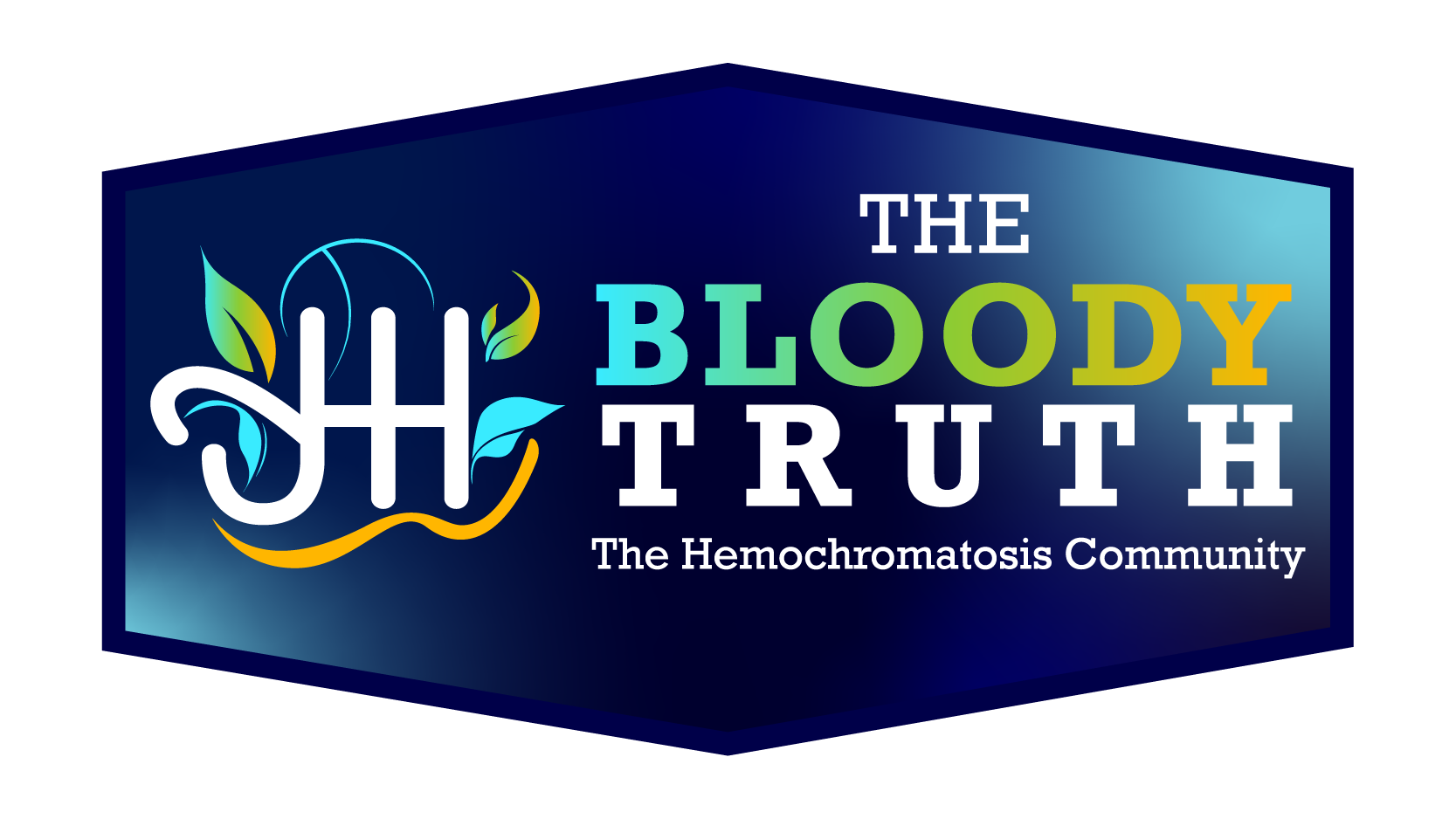
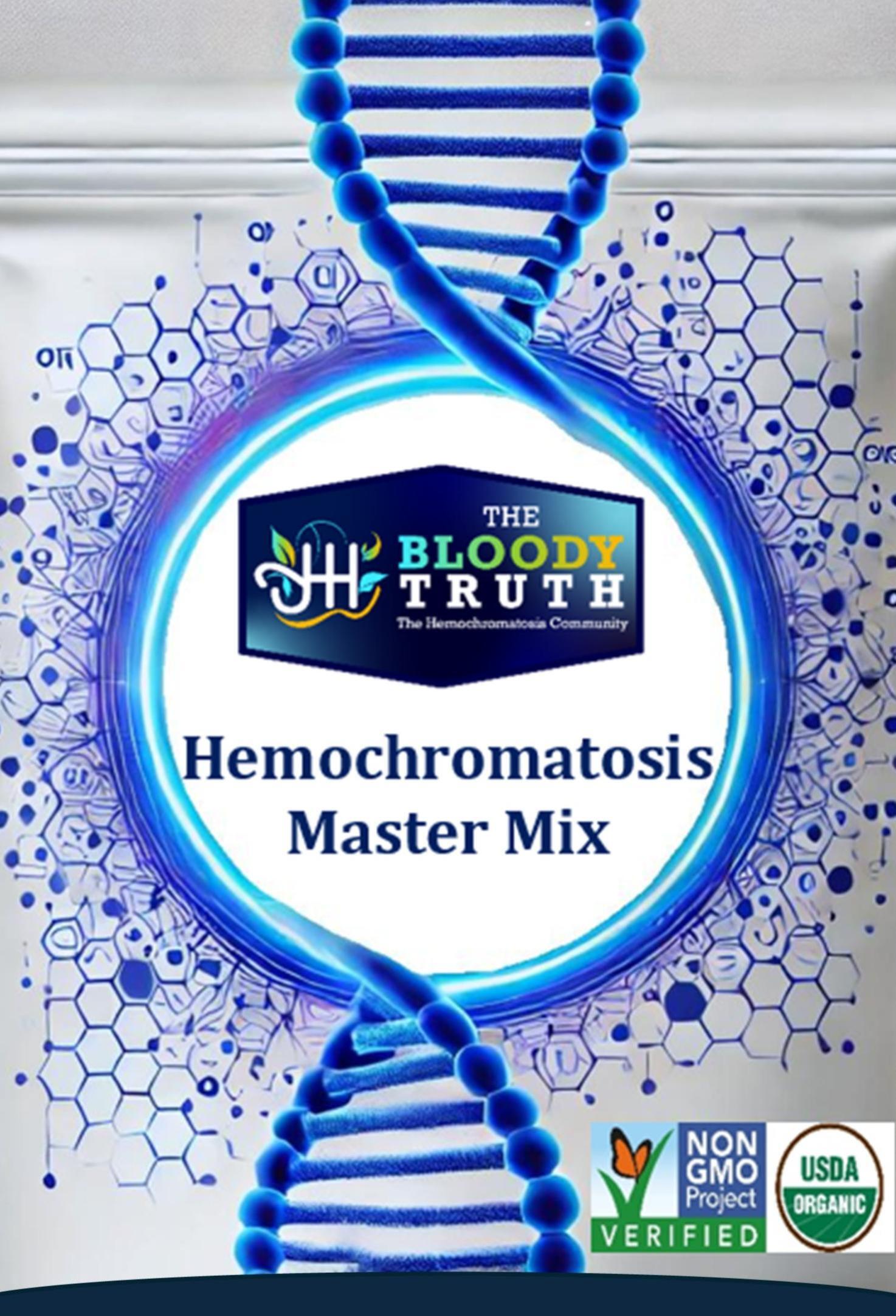
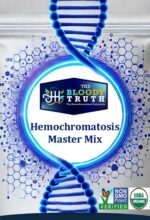
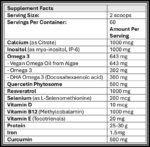













Reviews
There are no reviews yet.